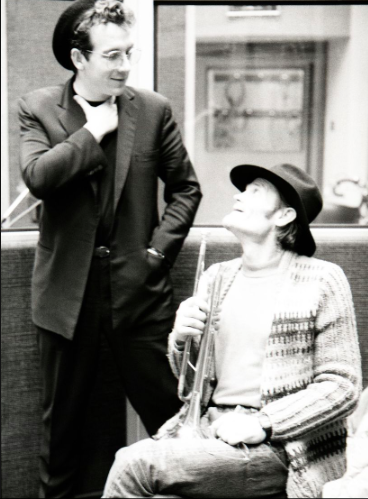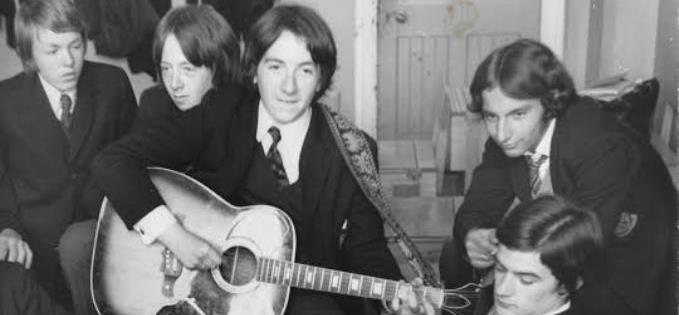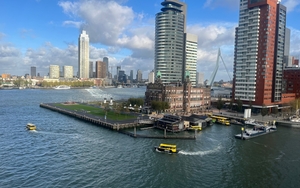THE grandson of a trumpet player on the White Star Line and son of a jazz musician who became a successful radio dance band vocalist, Declan Patrick MacManus was Liverpool’s adopted child.
In 1970, at the age of 16, while other aspiring musicians and artists in the city were eying the train timetable to Euston on a one way ticket, he did things the other way. He arrived in Liverpool from London with his mother knowing nobody but his relatives. Just eight years later he was taking the pop music world by storm.
 Elvis Costello with the proper legendary Chet Baker
Elvis Costello with the proper legendary Chet BakerHe always said he could write a book, and now he has done. Unfaithful Music & Disappearing Ink is an ofen wry look back on a career which has endured for almost four decades.
It’s a mighty tome of 674 pages. There is no chronological sequence of events, dip in anywhere to read about the blokes in Liverpool who could “insert five ‘fucks’ into a three-syllable word if they’ve got a point to make” or the memories of Liverpool Stadium, “a dank boxing venue that didn’t always have the blood washed off the seats”.
Tomorrow night (Monday October 26) Costello is back in Liverpool where he will be in conversation with crime writer and lifelong fan Mark Billingham at Liverpool’s Royal Court Theatre, a venue, say organisers Waterstones, which is “very close to Elvis' heart”.
Ahead of that, Liverpool Confidential has got hold of an exclusive extract from the memoir in which Costello talks about his early struggles get a foot on the musical ladder in 1970s Liverpool.
'We played our songs anywhere they would have us... even a Catholic girl’s school called Mary Help Of Christians'
By Elvis Costello
When I moved to Liverpool with my mother in the middle of 1970, I had just turned sixteen and knew no one other than my relations.
I stayed for a while with my uncle and my auntie Pat, was a beautiful woman of Irish descent with dark hair and a sharp tongue. She was almost in show business. She worked part-time as a receptionist at the Wookey Hollow, a vaguely notorious Anfield nightclub at which middle-aged women swooned to the operatic voice of the American singer Lovelace Watkins.
Every evening, I’d scan the Liverpool Echo, trying to find somewhere to play. Most of the folk club adverts specified “Traditional Folk Night.”
I quickly found out that they’d show you the door if you sang your own songs, while a flush-faced fellow in an itchy sweater, who’d never been farther out to sea than the ferryboat to New Brighton, would go off to great acclaim if he sang “The Holy Ground” or some endless whaling song.
I developed an unreasonable hatred of folk music.
 A young Elvis Costello plays with his band in Liverpool
A young Elvis Costello plays with his band in LiverpoolMy Dad, meanwhile, moved back into our old family home in Twickenham and was toying with forming a group of his own, a poetic enterprise involving a harp and a flute that went under the name The Hand-Embroidered Lemon-Peel. I was never really sure if this group really existed or if it was just an excuse for him to seduce hippie girls.
As 1970 turned into 1971, a lad from Walton named Allan Mayes invited me to join his new group, “Rusty”. We had a bass player and a feller called Dave, who owned a microphone and tambourine and was nominally our lead singer but as is often the case, the conflict of ambitions soon took care of the balance of power. Within a few weeks, the singer had sold his microphone and we were a trio

We played our songs anywhere they would have us; pubs, clubs, even a Catholic girl’s school called “Mary Help Of Christians”, which was known locally as, “Mary Feed The Pigeons”.
A ledger of our gigs, preserved in Allan’s old school notebook, reveals that we were paid “Nil” for that appearance but I suppose we might have imagined other rewards for playing there, even if none were forthcoming.
For a short while, our Friday night gig was at The Crow’s Nest pub in Widnes, a short drive in Allan’s Ford Anglia along the north bank of the Mersey into rugby league territory and where the accent tips to the sort of flat Lancastrian dialect that sounds as if the speaker has just been hit with a plank of wood.
The few bored-looking girls, nursing Babycham, sat puzzled through a few of our more esoteric songs and then ventured out of their corner to make a sarcastic-sounding request,
“Do you know any Slade?”
None of our songs bore any resemblance to “Cum On Feel the Noize,” so we gave up on Widnes, or maybe Widnes gave up on us.
*Elvis Costello is in conversation with Mark Billingham, Royal Court Theatre, Roe Street, L1, Monday, October 26, 7pm. discussing his new book, Unfaithful Music & Disappearing Ink (Penguin, £25). There will also be an audience Q&A and the chance to have books signed. Books will be available to buy on the evening.
Tickets will be £10 or for £30 you get admission to the event and a copy of the book, priced at £25. Please note - this offer will only be available online, here.













